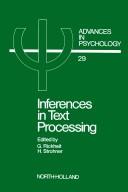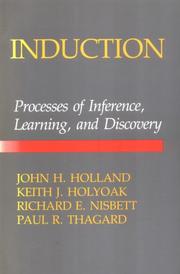| Listing 1 - 7 of 7 |
Sort by
|
Book
ISBN: 128199877X 9786611998776 0191568341 9780191568343 0199550492 9780199550494 9780199550494 9780198250944 1383013985 6611998772 Year: 2008 Publisher: Oxford New York Oxford University Press
Abstract | Keywords | Export | Availability | Bookmark
 Loading...
Loading...Choose an application
- Reference Manager
- EndNote
- RefWorks (Direct export to RefWorks)
James Allen presents an original and penetrating investigation of the theory of inference from signs, which played a central role in ancient philosophical and scientific method.
Inference --- Evidence --- Logic, Ancient. --- Ancient logic --- Proof --- Belief and doubt --- Faith --- Logic --- Philosophy --- Truth --- Ampliative induction --- Induction, Ampliative --- Inference (Logic) --- Reasoning --- History. --- Semiotics --- Inférence (Logique) --- Logique ancienne --- Sémiotique --- Histoire --- Evidence. --- Inference. --- Inférence (Logique) --- Logique ancienne. --- Évidence --- Histoire.
Multi
ISBN: 9780521747486 9780521766777 0521747481 052176677X 9781139028370 9781139336499 1139336495 9781139338233 1139338234 1139028375 1280393491 9781280393495 1139341391 9781139341394 1139334751 9781139334754 9786613571410 6613571415 1139339818 9781139339810 113933400X 113933736X Year: 2012 Publisher: Cambridge Cambridge University Press
Abstract | Keywords | Export | Availability | Bookmark
 Loading...
Loading...Choose an application
- Reference Manager
- EndNote
- RefWorks (Direct export to RefWorks)
When people speak, their words never fully encode what they mean, and the context is always compatible with a variety of interpretations. How can comprehension ever be achieved? Wilson and Sperber argue that comprehension is a process of inference guided by precise xpectations of relevance. What are the relations between the linguistically encoded meanings studied in semantics and the thoughts that humans are capable of entertaining and conveying? How should we analyse literal meaning, approximations, metaphors and ironies? Is the ability to understand speakers' meanings rooted in a more general human ability to understand other minds? How do these abilities interact in evolution and in cognitive development? Meaning and Relevance sets out to answer these and other questions, enriching and updating relevance theory and exploring its implications for linguistics, philosophy, cognitive science and literary studies
Lexicology. Semantics --- Psycholinguistics --- Semantics --- Relevance (Philosophy) --- Inference --- Cognition --- Sémantique --- Pertinence (Logique) --- Inférence (Logique) --- Semantics. --- Relevance. --- Inference. --- Cognition. --- 801.56 --- Syntaxis. Semantiek --- 801.56 Syntaxis. Semantiek --- Sémantique --- Inférence (Logique) --- Relevance --- Formal semantics --- Semasiology --- Semiology (Semantics) --- Comparative linguistics --- Information theory --- Language and languages --- Lexicology --- Meaning (Psychology) --- Pertinence --- Relevancy --- Meaning (Philosophy) --- Ampliative induction --- Induction, Ampliative --- Inference (Logic) --- Reasoning --- Psychology --- Arts and Humanities --- Language & Linguistics --- Inférence --- Théorie de la pertinence (linguistique) --- Inférence --- Théorie de la pertinence (linguistique)

ISBN: 0444878289 9780080866833 0080866832 1281788414 9781281788412 9786611788414 9780444878281 Year: 1985 Volume: 29 Publisher: Amsterdam ; New York : New York, N.Y., U.S.A. : North-Holland ; Sole distributors for the U.S.A. and Canada, Elsevier Science Pub. Co.,
Abstract | Keywords | Export | Availability | Bookmark
 Loading...
Loading...Choose an application
- Reference Manager
- EndNote
- RefWorks (Direct export to RefWorks)
This volume critically evaluates the present state of research in the domain of inferences in text processing and indicates new areas of research.The book is structured around the following theoretical aspects: - The representational aspect is concerned with the cognitive structure produced by the processed text, e.g. the social, spatial, and motor characteristics of world knowledge. - The procedural aspect investigates the time relationships on forming inferences, e.g. the point of time at which referential relations are constructed. - The contextual a
Cognitive psychology --- Psycholinguistics --- Discourse analysis --- Comprehension --- Inference --- Analyse du discours --- Compréhension --- Inférence (Logique) --- Psychological aspects --- Aspect psychologique --- Cognition --- Decision Making --- Comprehension. --- Inference. --- Ampliative induction --- Induction, Ampliative --- Inference (Logic) --- Reasoning --- Understanding --- Apperception --- Learning, Psychology of --- Memory --- Psychological aspects. --- Cognitive Function --- Cognitions --- Cognitive Functions --- Function, Cognitive --- Functions, Cognitive --- Credit Assignment --- Assignment, Credit --- Assignments, Credit --- Credit Assignments --- Citizen Science --- Problem Solving --- Discourse analysis - Psychological aspects
Book
ISBN: 9789004183193 9004183191 1283039117 9786613039118 9004190996 9789004190993 9781283039116 661303911X Year: 2010 Volume: 80 80 Publisher: Leiden Boston Brill
Abstract | Keywords | Export | Availability | Bookmark
 Loading...
Loading...Choose an application
- Reference Manager
- EndNote
- RefWorks (Direct export to RefWorks)
Relational inferences are a well-known problem for Aristotelian logic. This book charts the development of thinking about this anomaly, from the beginnings of the Arabic logical tradition in the tenth century to the end of the nineteenth. Based in large part on hitherto unstudied manuscripts and rare books, the study shows that the problem of relational inferences was vigorously debated in the thirteenth, fourteenth and fifteenth centuries. In the course of the seventeenth and eighteenth centuries, Ottoman logicians (writing in Arabic) came to recognize relational inferences as a distinct kind of 'unfamiliar syllogism' and began to investigate their logic. These findings show that the development of Arabic logic did not - as is often supposed - come to an end in the fourteenth century. On the contrary, Arabic logic was still being developed by critical and fecund reflections as late as the eighteenth and nineteenth centuries.
Syllogism --- Islamic philosophy --- Inference. --- Syllogisme --- Philosophie islamique --- Inférence (Logique) --- History. --- Histoire --- Inference --- History --- Islamic philosophy -- History. --- Syllogism -- History. --- Philosophy --- Philosophy & Religion --- Logic --- Inférence (Logique) --- Ampliative induction --- Induction, Ampliative --- Inference (Logic) --- Argumentation --- Reasoning --- Logic, Symbolic and mathematical --- Syllogism - History --- Islamic philosophy - History
Book
ISSN: 18646409 ISBN: 9781614513865 9781614512776 1614513864 1299724604 1614512779 Year: 2013 Volume: 15 Publisher: Berlin De Gruyter Mouton
Abstract | Keywords | Export | Availability | Bookmark
 Loading...
Loading...Choose an application
- Reference Manager
- EndNote
- RefWorks (Direct export to RefWorks)
In pragmatics, it is widely accepted that the overall meaning of an utterance performed as part of a verbal interchange is basically underdetermined by the meaning of the sentence uttered. What counts as having been said for most contemporary authors goes far beyond sentence meaning. Rather, it has to be considered as a complex utterance level combining semantic knowledge and context-driven, pragmatic information as an integrated whole. The focus of the present book lies on central questions about the nature, the function and the acquisition of pragmatic inferencing strategies. The question of the relation between the explicit and the implicit side of verbal communication and its mutual delimitation is addressed. What is the character of pragmatic inferences, wherever they may be situated in a descriptive model? Are they nonce inferences arising anew in each act of communication, or do we have to conceive of them as based on regularities and conventions? What is an adequate model of the acquisition of the skills which are relevant for mastering the inferential processes leading to an adequate interpretation of utterances? And what is the relation between a theory of pragmatic enrichment and optimality theory with an OT pragmatics as a possible result?
Lexicology. Semantics --- Grammar --- Pragmatics --- Pragmatique --- Inférence --- Connecteurs (linguistique) --- Pragmatics. --- Inference. --- Semantics. --- Grammar, Comparative and general --- Language and languages --- Connectives. --- Philosophy. --- 801.57 --- Pragmatiek --- Pragmatik. --- Schlussfolgern. --- Grammar, Comparative and general - Connectives. --- Language and languages - Philosophy. --- Inference --- Semantics --- Languages & Literatures --- Philology & Linguistics --- Connectives --- Philosophy --- 801.57 Pragmatiek --- Connectives (Linguistics) --- Sentence connectors --- Ampliative induction --- Induction, Ampliative --- Inference (Logic) --- Formal semantics --- Semasiology --- Semiology (Semantics) --- Pragmalinguistics --- Reasoning --- Comparative linguistics --- Information theory --- Lexicology --- Meaning (Psychology) --- General semantics --- Logic, Symbolic and mathematical --- Semantics (Philosophy) --- Function words --- Syntax --- Pragmatique. --- Inférence. --- Linguistics --- Philology --- Inférence.

ISBN: 0674001583 0674006925 0674028732 0674266749 9780674006928 Year: 2000 Publisher: Cambridge, Mass. Harvard University Press
Abstract | Keywords | Export | Availability | Bookmark
 Loading...
Loading...Choose an application
- Reference Manager
- EndNote
- RefWorks (Direct export to RefWorks)
Robert B. Brandom is one of the most original philosophers of our day, whose book Making It Explicit covered and extended a vast range of topics in metaphysics, epistemology, and philosophy of language--the very core of analytic philosophy. This new work provides an approachable introduction to the complex system that Making It Explicit mapped out. A tour of the earlier book's large ideas and relevant details, Articulating Reasons offers an easy entry into two of the main themes of Brandom's work: the idea that the semantic content of a sentence is determined by the norms governing inferences to and from it, and the idea that the distinctive function of logical vocabulary is to let us make our tacit inferential commitments explicit. Brandom's work, making the move from representationalism to inferentialism, constitutes a near-Copernican shift in the philosophy of language--and the most important single development in the field in recent decades. Articulating Reasons puts this accomplishment within reach of nonphilosophers who want to understand the state of the foundations of semantics.Table of Contents: Introduction 1. Semantic Inferentialism and Logical Expressivism 2. Action, Norms, and Practical Reasoning 3. Insights and Blindspots of Reliabilism 4. What Are Singular Terms, and Why Are There Any? 5. A Social Route from Reasoning to Representing 6. Objectivity and the Normative Fine Structure of Rationality Notes Index Displaying a sovereign command of the intricate discussion in the analytic philosophy of language, Brandom manages successfully to carry out a program within the philosophy of language that has already been sketched by others, without losing sight of the vision inspiring the enterprise in the important details of his investigation ' Using the tools of a complex theory of language, Brandom succeeds in describing convincingly the practices in which the reason and autonomy of subjects capable of speech and action are expressed.--J'rgen Habermas
Expression (Philosophy) --- Inference --- Language and languages --- -Language and logic --- Reasoning --- Semantics (Philosophy) --- Intension (Philosophy) --- Logical semantics --- Semantics (Logic) --- Semeiotics --- Significs --- Syntactics --- Unified science --- Argumentation --- Ratiocination --- Ampliative induction --- Induction, Ampliative --- Inference (Logic) --- Self-expression --- Foreign languages --- Languages --- Linguistics and logic --- Logic in language --- Philosophy --- Language and logic --- Logic, Symbolic and mathematical --- Logical positivism --- Meaning (Psychology) --- Philosophy, Modern --- Semiotics --- Signs and symbols --- Symbolism --- Analysis (Philosophy) --- Definition (Philosophy) --- Reason --- Thought and thinking --- Judgment (Logic) --- Logic --- Semantics --- Lexicology. Semantics --- Philosophy of language --- Language and logic. --- Expression (Philosophy). --- Inference. --- Reasoning. --- Semantics (Philosophy). --- Langage et langues --- Sémantique (Philosophie) --- Inférence (Logique) --- Raisonnement --- Langage et logique --- Expression (Philosophie) --- Philosophy. --- Philosophie --- Inférence --- Philosophie du langage --- Signification (philosophie)

ISBN: 0262081601 0262580969 0262275570 0585353484 9780262081603 9780262580960 9780262275576 9780585353487 Year: 1989 Publisher: Cambridge, Mass. MIT
Abstract | Keywords | Export | Availability | Bookmark
 Loading...
Loading...Choose an application
- Reference Manager
- EndNote
- RefWorks (Direct export to RefWorks)
Two psychologists, a computer scientist, and a philosopher have collaborated to present a framework for understanding processes of inductive reasoning and learning in organisms and machines. Theirs is the first major effort to bring the ideas of several disciplines to bear on a subject that has been a topic of investigation since the time of Socrates. The result is an integrated account that treats problem solving and induction in terms of rulebased mental models.Induction is included in the Computational Models of Cognition and Perception Series.A Bradford Book.
Artificial intelligence --- Inference --- Learning, Psychology of --- Machine learning --- Memory --- 681.3*I26 --- Kunstmatige intelligentie --- Retention (Psychology) --- Intellect --- Psychology --- Thought and thinking --- Comprehension --- Executive functions (Neuropsychology) --- Mnemonics --- Perseveration (Psychology) --- Reproduction (Psychology) --- Learning, Machine --- Machine theory --- Learning --- Psychology of learning --- Educational psychology --- Learning ability --- Ampliative induction --- Induction, Ampliative --- Inference (Logic) --- Reasoning --- AI (Artificial intelligence) --- Artificial thinking --- Electronic brains --- Intellectronics --- Intelligence, Artificial --- Intelligent machines --- Machine intelligence --- Thinking, Artificial --- Bionics --- Cognitive science --- Digital computer simulation --- Electronic data processing --- Logic machines --- Self-organizing systems --- Simulation methods --- Fifth generation computers --- Neural computers --- Learning: analogies concept learning induction knowledge acquisition language acquisition parameter learning (Artificial intelligence)--See also {681.3*K32} --- Psychological aspects --- Artificial intelligence. --- Induction (Logic) --- Inference. --- Learning, Psychology of. --- Machine learning. --- Memory. --- Experimentele psychologie --- leren en intelligentie --- Induction (Logic). --- leren en intelligentie. --- 681.3*I26 Learning: analogies concept learning induction knowledge acquisition language acquisition parameter learning (Artificial intelligence)--See also {681.3*K32} --- Inférence (Logique) --- Psychology, Educational --- Inductive logic --- Logic, Inductive --- Inférence (Logique) --- Logics --- Computational Intelligence --- AI (Artificial Intelligence) --- Computer Reasoning --- Computer Vision Systems --- Knowledge Acquisition (Computer) --- Knowledge Representation (Computer) --- Machine Intelligence --- Acquisition, Knowledge (Computer) --- Computer Vision System --- Intelligence, Computational --- Intelligence, Machine --- Knowledge Representations (Computer) --- Reasoning, Computer --- Representation, Knowledge (Computer) --- System, Computer Vision --- Systems, Computer Vision --- Vision System, Computer --- Vision Systems, Computer --- Applied Psychology --- Applied Psychologies --- Psychologies, Applied --- Information Sciences --- Science, Information --- Sciences, Information --- High Performance Computing --- Methodologies, Computing --- Computing Methodology --- Computing, High Performance --- Methodology, Computing --- Performance Computing, High --- Computing Methodologies --- Philosophy --- Personality --- Mental Processes --- Humanities --- Information Science --- Behavior and Behavior Mechanisms --- Psychological Phenomena and Processes --- Psychology, Applied --- Psychiatry and Psychology --- Artificial Intelligence --- Logic --- Intelligence --- Social Sciences --- Memory Training --- Phenomenography --- Training, Memory --- Memory Consolidation --- Education --- Heuristics --- Psychologic Processes --- Psychologic Processes and Principles --- Psychological Processes --- Phenomena, Psychological --- Processes, Psychologic --- Processes, Psychological --- Psychological Phenomenas --- Psychological Processe --- Human Information Processing --- Information Processing, Human --- Educational Psychology --- Educational Psychologies --- Psychologies, Educational --- Personalities --- Human Characteristics --- Pharmacy Philosophy --- Philosophical Overview --- Hedonism --- Stoicism --- Overview, Philosophical --- Overviews, Philosophical --- Pharmacy Philosophies --- Philosophical Overviews --- Philosophies --- Philosophies, Pharmacy --- Philosophy, Pharmacy --- 681.3*I3 --- 681.3*I3 Computer graphics (Computing methodologies) --- Computer graphics (Computing methodologies) --- 681.3*I26 Learning: analogies; concept learning; induction; knowledge acquisition; language acquisition; parameter learning (Artificial intelligence)--See also {681.3*K32} --- Learning: analogies; concept learning; induction; knowledge acquisition; language acquisition; parameter learning (Artificial intelligence)--See also {681.3*K32} --- Artificial intelligence. Robotics. Simulation. Graphics --- Philosophy of science --- Induction (Logique) --- Intelligence artificielle --- Psychologie de l'apprentissage --- Apprentissage automatique --- Mémoire --- Machine Learning --- Psychological Phenomena --- Wetenschapsfilosofie --- Logica --- Artificiële intelligentie. Robotica. Simulatie. Graphics --- COGNITIVE SCIENCES/General --- COGNITIVE SCIENCES/Psychology/Cognitive Psychology --- Induction (logique) --- Intelligence artificielle. --- Inférence. --- Inférence.
| Listing 1 - 7 of 7 |
Sort by
|

 Search
Search Feedback
Feedback About UniCat
About UniCat  Help
Help News
News